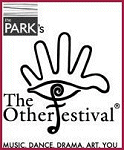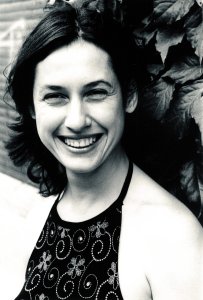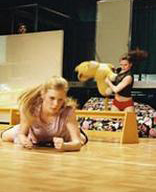| The Park’s
The Other Festival - 2004
Music. Dance. Drama. Art. You. The Chinmaya
Heritage Centre, Chennai
|
 |
CONSTANZA
MACRAS & Dorky Park (Germany), “Back to the Present” – Contemporary
Dance.
A
Max Mueller Bhavan Collaboration (135 mins)
|
|
 |
|
| Back to the Present: With her site-specific performance "Back to the Present", which was performed in June and September 2003 in a former department store in the centre of Berlin, Constanza Macras goes for a journey into the past. Memory as looped feedback, live performances, dance, music and videos form a space installation, wherein the audience moves around.There was also a tea-salon run by the ladies from the Ground Control and a bar hidden somewhere in the labyrinth of abandoned rooms. Where do you go when you don't want to deal with the past or the future? The performers of the Back to the Present find themselves in a common space; a casting for a reality show like big brother, survivor or Miss Right. These shows are constantly recreated around the world sometimes with different names and they all have in common that they only exist in the present, in the flatness of everyday struggles. | ||
| Exclusive
interview with Constanza Macras
by Lalitha Venkat With your
new style of work, did you have to struggle much in the early part of your
career?
Where it made a difference was conforming to a company of people that decided to make a commintment to me themselves and the kind of work we do. That gives me a lot more energy to face a system that still is male dominated - which one is not?! Also, thank god the 90's are over. The kind of work that ruled in Europe then was about commending performances about the self absorption of the European artistes watching himself - mostly, sometimes herself - performing. When you
conceive a piece, you evolve it over the years. Don’t you get tired of
it?
Now we are starting a new period,
a new piece... I work for long periods of time to develop a piece, and
during a long period I accumulate information related to the subject of
the piece. I have many works running parallel, we have ideas with the
Alongside
improvising on your old work, when do you feel it’s time to develop new
work? Is it a group effort?
There is a lot of freedom in the work and each of them is very important. I work with people experiences and characters that make each of them impossible to replace. In your
productions, you use dancers and actors. How do you strike a balance between
them?
You are
known to pick unusual themes (Beatles!) and settings (supermarket). What
do you look for in such instances and how do you know if it will work?
Because
of the themes you choose, do you feel stressed every time you premiere
a new work?
Contact:
|
